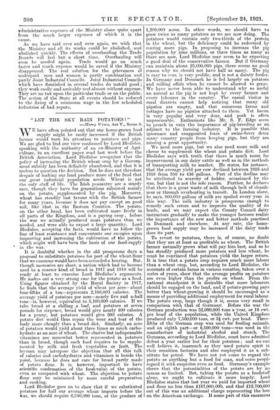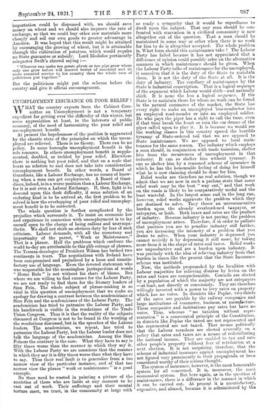"LET THE SKY RAIN POTATOES ! "
—Merry Wives, Act V., Scone 5.
WE have often pointed out that our home-grown food supply might be easily increased if the British farmer would turn his attention to potatoes and pigs. We are glad to find our view confirmed by Lord Bledisloe, speaking with the authority of an ex-Minister of Agri- culture, in an excellent paper read last week before the British Association. Lord Bledisloe recognizes that the policy of increasing the British wheat crop by a Govern- ment subsidy has been definitely abandoned, and that it is useless to question the decision. But he does not therefore despair of making our land produce more of the food that our great industrial population needs. Wheat is not the only staff of life. The Irish peasantry are a sturdy race, though they have for generations subsisted mainly on the potato, supplemented by the pig. Moreover, wheat has steadily lost favour with the British farmer for many years, because it does not pay except on good soil, like that in the Eastern Counties. The potato, on the other hand, has been cultivated more freely in all parts of the Kingdom, and is a payine. crop ; before the war we actually produced more potatoes than we needed, and were able to export a large quantity. Lord Bledisloe, accepting the facts, would have us follow the line of least resistance and concentrate our energies upon improving and increasing the cultivation of the potato, which might well have been the basis of our food-supply in the war.
It is doubtful whether in the old prosperous days a proposal to substitute potatoes for part of the wheat-flour that we consume would have been accorded a hearing. But, though memories are short, a nation which had to become used to a coarser kind of bread in 1917 and 1918 will be ready at least to examine Lord Bledisloe's arguments. He makes out a very strong case for the potato as a food. Using figures obtained by the Royal Society in 1917, he finds that the average yield of wheat per acre—about four-fifths of a ton—represents 2,100,000 calories. The average yield of potatoes per acre—nearly five and a-half tons—is, however, equivalent to 5,100,000 calories. If we take bread at a shilling a loaf, and potatoes at seven pounds for sixpence, bread would give nearly 400 calories, for a penny, but potatoes would give 500 calories. A potato diet would thus repair the wear and tear of the body more cheaply than a bread diet. Similarly, an acre of potatoes would yield about three times as much carbo- hydrate as an acre of wheat. The elusive but indispensable vitamines are somewhat better represented in potatoes than in bread, though each food requires to be supple- mented by milk and fresh vegetables or fruit. The layman may interpose the objection that all this talk of calories and carbohydrates and vitamines is beside the point, because he does not care for bread partly made of potato flour. It is, however, important to have scientific confirmation of the food-value of the potato, even as compared with wheat. The objection to potato flour may be minimized by more careful preparation and cooking.
Lord Bledisloe goes on to show that if we substituted potatoes for half our average wheat imports before the war. we should require 6,V,00,000 tons, or the produce of 1,280,000 acres. In other words, we should have to grow twice as many potatoes as we are now doing. The potatoes would contain only two-thirds of the protein in the wheat, but the deficiency could be redeemed by rearing more pigs. In proposing to increase the pig population by nine millions, or three times as many as there are now, Lord Bledisloe may seem to be expecting a good deal of the conservative farmer. But if Germany can maintain about 25,000,000 pigs, there seems no good reason why we should not have half as many. The pig is easy to rear, is very prolific, and is not a dainty feeder. In Germany and Denmark he is fed largely on potatoes and milling offals when he cannot be allowed to graze. We have never been able to understand why so useful an animal as the pig is not kept by every farmer and every labourer in the country. The casual visitor in rural districts cannot help noticing that many old pigsties are empty, and that numerous farms and cottages have no pigsties attached to them. Yet bacon is very popular and very dear, and pork is often unprocurable. Enthusiasts like Mr. S. F. Edge seem to preach in vain the importance of pig-breeding as an adjunct to the farming industry. It is possible that ignorance and exaggerated fears of swine-fever deter many country people from keeping pigs, but they are missing a great opportunity. We need more pigs, but we also need more milk and cheese to supplement the wheat and potato diet. Lord Bledisloe says with truth that there is much room for improvement in our dairy cattle as well as in the methods of transporting milk to market. He states, for instance, that the average yield per cow declined between 1916 and 1918 from 550 to 436 gallons. Part of the decline may be attributed to scarcity of fodder, occasioned by the war, but that is not the sole reason. Further, he declares that there is a great waste of milk through lack of cleanli- ness or through overheating in transit. In London alone, he says, 900,000 gallons of milk are spoiled every year in this way. The milk industry is prosperous enough to remedy such errors and to improve the quality of its herds, and we may expect the County Council dairy instructors gradually to make the younger farmers realize the importance of the new and better methods practised in Denmark and elsewhere. At any rate, the home- grown food supply may be increased if the dairy trade does its part.
To revert to potatoes, there is, of course, no doubt that they are at least as profitable as wheat. The British farmer naturally grows what will pay him best, and as he has steadily produced more potatoes and less wheat, he must be convinced that potatoes yield the larger return. It is true that a potato crop requires much more labour than a wheat crop, but, according to Lord Blcdisloe, the accounts of certain farms in various counties, taken over a series of years, show that the average profits on potatoes are even higher than the profits on wheat. From the national standpoint it is desirable that more labourers should be engaged on the land, and if potato-growing pays better than wheat-growing it should be encouraged as a means of providing additional employment for rural labour. The potato crop, large though it is, seems very small in comparison with that of Germany. Before the war the German production was 52,000,000 tons a year, or 16 cwt. per head of the population, while the United Kingdom produced only 7,500,000 tons, or 3} cwt. per head. Three- fifths of the German crop was used for feeding animals, and an eighth part—or 6,500,000 tons—was used in the manufacture of industrial alcohol and starch. The Germans, according to Lord Bledisloe, must have admitted defeat a year earlier but for their potatoes ; and we can well believe it, inasmuch as they used potato spirit in their munition factories and also employed it as a sub- stitute for petrol. We have not yet come to regard the potato as anything but a food for man, and some people regard it with suspicion even as food. Germany's example shows that the potentialities of the potato are by no means so limited. But, taking the potato as a foodstuff alone, we ought to cultivate it more largely. Lord Bledisloe states that last year we paid for imported wheat and flour no less than £167,000,000, and that £12,700,000 out of this was an additional charge representing the loss on the American exchange. If some part of this enormous importation could be dispensed with, we should save money on wheat and we should also improve the rate of exchange, so that we could buy other raw materials more cheaply and sell our own goods to greater advantage in America. It was hoped that this result might be attained by encouraging the growing of wheat, but it is attainable through the cultivation of potatoes, which would require no State guarantee or subsidy. Lord Bledisloe pertinently misquotes Swift's shrewd saying Whoever can make two potato 22/ants or two pigs grow where only one grew before will deserve better of mankind and do more essential service to his country than the whole race of politicians put together."
But the politicians might put the scheme before the country and give it official encouragement.



































 Previous page
Previous page